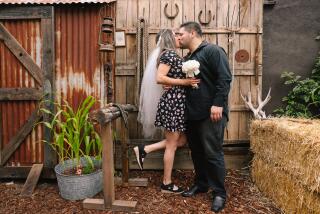Southern California Brides : Something Old, Something New, Including Chins and Noses
- Share via
Yuriza Madariaga knew exactly how she wanted to wear her long, dark hair for her wedding: off her face in an elegant upswept style.
But as she saw it, there were two obstacles to the hairstyle of her dreams--her ears. Ever since age 12, she says, she’d been so self-conscious about her protruding ears that she carefully covered them with her hair.
But as her wedding day approached, the 27-year-old Eagle Rock administrative assistant yearned for a more permanent solution--having a procedure called otoplasty, in which the ears are repositioned closer to the head.
She broached the subject with her doting fiance, 26-year-old Christian Martinez of Glendale, a custody officer for the Los Angeles County Sheriff’s Department. “Anything you want,” he told her.
The conversation got him to thinking. His nose, broken three times in falls and a baseball accident, had a noticeable bump. The breaks, he says, affected his sinuses, in turn producing frequent headaches.
“If you’re going to get your ears fixed,” he told his bride-to-be, “I’m going to get my nose fixed.”
A small but growing number of brides and grooms like Madariaga and Martinez are adding cosmetic surgery to their wedding preparation to-do lists.
Choice of Surgery Differs With Age
For many years, cosmetic surgeons have nipped and tucked mothers of the bride or groom trying to fit into a special gown or cope with midlife transition. And while the moms are still the most likely members of the wedding party to visit a cosmetic surgeon, some of their sons and daughters are now joining them.
The type of surgery requested by brides and grooms is driven by their ages, says Dr. Richard Fleming, a Beverly Hills facial plastic and reconstructive surgeon and clinical professor of facial plastic and reconstructive surgery at USC School of Medicine. “The younger [brides and grooms] tend to want treatment for unwanted inherited physical characteristics, such as noses and chins,” Fleming says. Older brides and grooms want “rejuvenation surgery” such as laser skin resurfacing, a face lift, brow lift, eyelid improvement or liposuction.
Four months before their Aug. 28 wedding, Madariaga had otoplasty and Martinez later had his nose reshaped, chin augmented and liposuction under the chin. Total tab for the couple: a bit over $12,000, which the couple is paying off over time.
“We feel like it is an investment,” says Martinez, beaming after his wedding in his shawl-collared black tuxedo, white vest and white bow tie, with no signs of swelling remaining from the procedures. His bride wore a white organza gown with a beaded bodice and had her hair pulled back with her ears visible under a pearl beaded headpiece and veil.
The surgeries reduced their self-consciousness, he says. “And I haven’t had any more headaches.”
No specific statistics on brides and grooms undergoing cosmetic surgery are kept by professional organizations, although cosmetic procedures in general are on the rise.
In 1998, there were nearly 2.8 million cosmetic procedures performed by physicians board-certified in plastic surgery, dermatology and otolaryngology (ear, nose and throat), up 4% from 1997, according to the American Society for Aesthetic Plastic Surgery. The Southern California surgeons interviewed for this article report a range in the numbers of brides and grooms they see--from just a few per year to 50 or so.
They predict the trend will grow as the age for first-time marriage creeps up and couples who have been in the work force for a while have a fatter wedding budget. Cosmetic surgery is viewed as more acceptable these days, too, especially by Generation X-ers and baby boomers, according to a survey of 1,000 men and women sponsored by the American Society for Aesthetic Plastic Surgery. In all, 63% of boomers approve while 55% of those 18 to 34 approve.
“Sometimes patients don’t mention the wedding at first,” says Dr. Malcolm Paul, a Newport Beach plastic and reconstructive surgeon and clinical assistant professor of plastic surgery at UC Irvine College of Medicine. “They will ask, ‘How long does this take to heal?’ ” Then they mention that their wedding is in a few weeks or months.”
Typically, surgeons say, people have been thinking about having the procedures done for a long time, and the wedding date spurs them into action. “I thought about it for at least a year,” says Kristy Henderson, 28, a Huntington Beach hospital employee who had breast augmentation a few months before her wedding last year. “The [upcoming] wedding was the turning point. You want everything to fit right.”
Adds Dr. Bruce Achauer, an Orange plastic and reconstructive surgeon and UC Irvine’s chief of plastic surgery: “People tend to get plastic surgery done for an event.” Besides a wedding, reunions or a significant birthday are often triggers.
“Knowing it was going to be my wedding day soon propelled my decision,” says Carolyn Vu, 29, a Westminster elementary school teacher, who underwent breast reduction six months before her July 1999 wedding. She wanted to eliminate the back and neck pain that had bothered her for years, while allowing plenty of healing time before gown shopping.
One More Thing to Stress About
Cosmetic surgeons say they’re happy to add to wedding-day bliss but offer some caveats. Don’t decide on surgery, they warn, at the insistence of your spouse-to-be.
“As long as they are doing it for themselves, I think that is fine,” says Dr. Gerald H. Pitman, a Manhattan plastic and reconstructive surgeon and clinical professor of plastic surgery at New York University School of Medicine. Pitman says patients should also be aware that undergoing cosmetic surgery, like planning a wedding, is stressful and should think about whether they can shoulder any more stress before the wedding.
Allowing six weeks to three months between surgery and ceremony is generally recommended, depending on the procedure, to allow swelling and redness to subside and to treat any complications. Procedures such as Botox injections to reduce facial wrinkles can be done much closer to the wedding, Achauer says. But he generally advises patients undergoing more extensive procedures to give themselves two or three months.
Squeezing in surgery too close to the nuptials could be disastrous. One woman recalls a good friend who had breast augmentation three weeks before her wedding.
“Although the surgery went fine, and her recovery was uneventful, she was worried that sexual activity at three weeks post-op might be too strenuous for her new breasts,” the friend recalls. (Typically, doctors advise breast augmentation patients to avoid contact with the breasts or strain such as weightlifting for about three weeks postoperatively to minimize the risk of complications such as pulling open of stitches.)
“She and her new husband ended up having a fight about it on their wedding night,” says the friend, “and he slept on the couch.”
More to Read
Sign up for Essential California
The most important California stories and recommendations in your inbox every morning.
You may occasionally receive promotional content from the Los Angeles Times.










